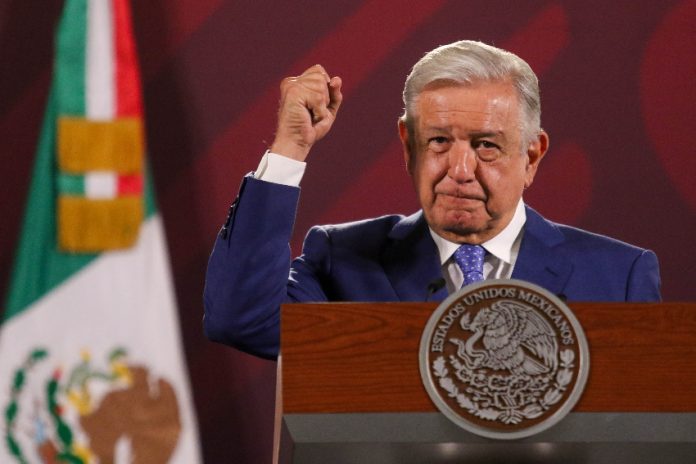There is no shortage of recurring segments at President López Obrador’s morning press conferences, or mañaneras: an update on the Maya Train railroad every Monday, the regular “Zero Impunity” security report, the “Who’s Who in the Lies of the Week” fake news exposé session on Wednesdays, to name a few.
AMLO decided this week that he needed a new section for himself, but paradoxically – especially for a man with a seemingly indefatigable capacity for oratory – it involves him keeping mum.
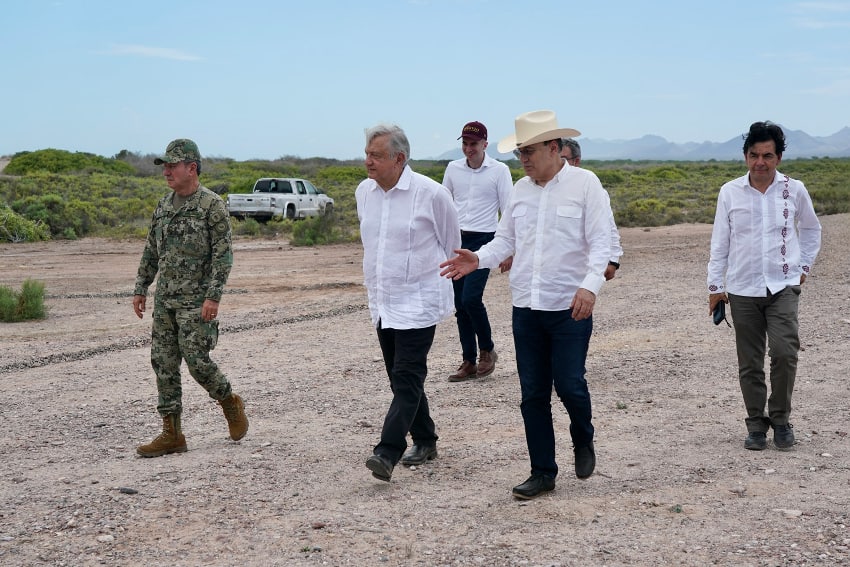
The president, however, is not about to take a vow of silence. He spoke on a range of topics this week, including an upcoming meeting with the president of Colombia, the government’s as yet unfulfilled plan to move several ministries out of Mexico City and the corruption case involving former Pemex CEO Emilio Lozoya.
Monday
Responding to his first question of the week, AMLO reiterated that he would comply with an order from the National Electoral Institute (INE) to abstain from speaking about electoral issues in the lead-up to the 2024 elections.
However, he expressed his dislike for the INE’s directive, saying that it was “very unfair” that “the group of potentates who felt that they owned Mexico” could speak out against the government and ruling Morena party while “the authorities restrict our freedom … of speech.”
“… Our adversaries would like us to be tied up and silent. They would like to silence us and just speak themselves – talking and talking and talking and lying and lying and lying and slandering, slandering, slandering on radio, on television, in the newspapers,” López Obrador said.
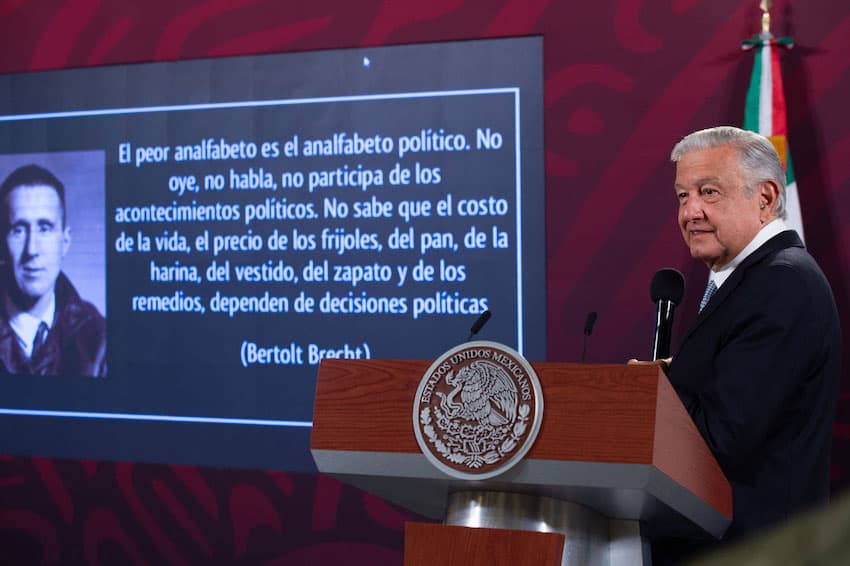
The president subsequently fielded a question about the Texas government’s installation of floating barriers in the Rio Grande to deter migrant crossings.
“I would just tell our compatriots to not vote for the governor of Texas or the Republican Party lawmakers who support these measures,” AMLO said.
“… I’m sure that these Republican Party politicians from Texas go to church, but they forget what the Bible says. The Old Testament says you mustn’t treat strangers badly,” he said.
Later in his presser, López Obrador asserted that there are “four factors” that have caused the Mexican peso to strengthen against the US dollar.
“One of those factors is the increase in remittances – what our compatriots [abroad] send to their families in Mexico is going to exceed US $60 billion [in 2023],” he said.
AMLO said that the other three factors behind the strengthening of the peso – which remained at under 17 to the US dollar on Monday – were strong foreign investment inflows, “healthy public finances” and “peace, political stability and governability in Mexico.”
He subsequently said there was “another element” that has also had an impact on the peso – “the Bank of Mexico’s policy of increasing interest rates.”
López Obrador later acknowledged that he visited several northern states last weekend including Sonora, where the U.S. company Mexico Pacific Limited is planning to build a natural gas pipeline and liquefaction plant.
“It’s an investment of a United States company in partnership with the Federal Electricity Commission [CFE]. … It’s an investment of about US $13 billion,” he said.
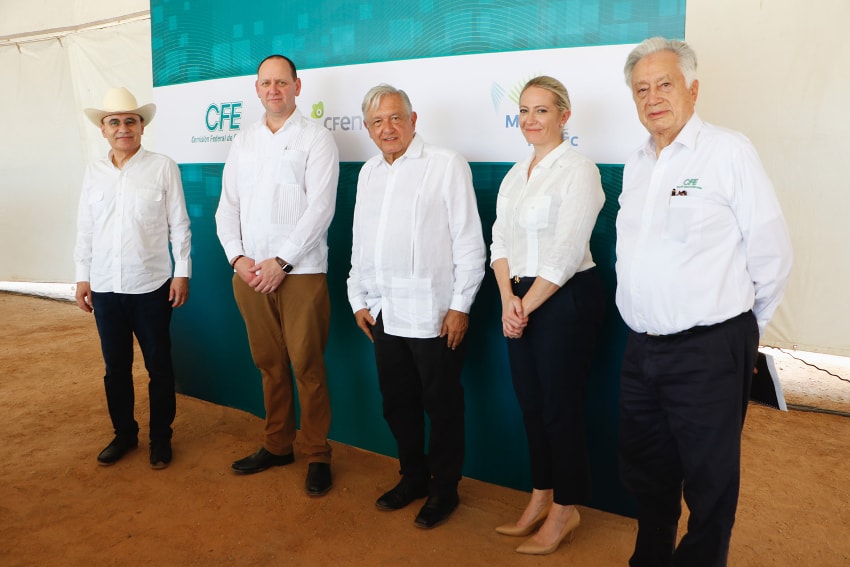
“… [The CFE] will be a partner of the complex that will be built in Puerto Libertad and will make a profit,” AMLO said, adding that the money the state-owned company takes in will help it keep electricity prices down.
He said that the gas pipeline will start in Texas and cross five municipalities in Chihuahua and 10 in Sonora before reaching the Puerto Libertad plant, located on the Gulf of California coast in the municipality of Pitiquito.
“The permits were already granted and a consultation is being carried out with the people. [The project] will create about 13,000 direct jobs and 20,0000 indirect ones. It’s a very good investment,” López Obrador said.
Tuesday
A 20-kilometer section of the Mexico City-Toluca railroad – a 58-kilometer-long project begun during the 2012-18 presidency of Enrique Peña Nieto – will begin operations on Sept. 14, announced Jorge Mendoza Sánchez, general director of the state-owned development bank Banobras.
“We’re going to begin with the Zinacantepec to Lerma section, in México state,” Mendoza said, referring to municipalities that border Toluca to the west and east, respectively.
He said that the trip will take 16 minutes with trains running every 10 minutes. López Obrador said in June that trains would begin running along the entire railroad – which was originally scheduled to be finished in 2017 – in the first quarter of 2024.
Behind the mañanera lectern on Tuesday, AMLO said that officials would be presenting updates on transport-related infrastructure projects all week.
“It mustn’t be thought that it’s just the Maya Train and the Isthmus [of Tehuantepec railroads that the government is building]. Of course they’re very important projects, but the same thing is being done in the center of the country – very important projects with public investment,” he said.
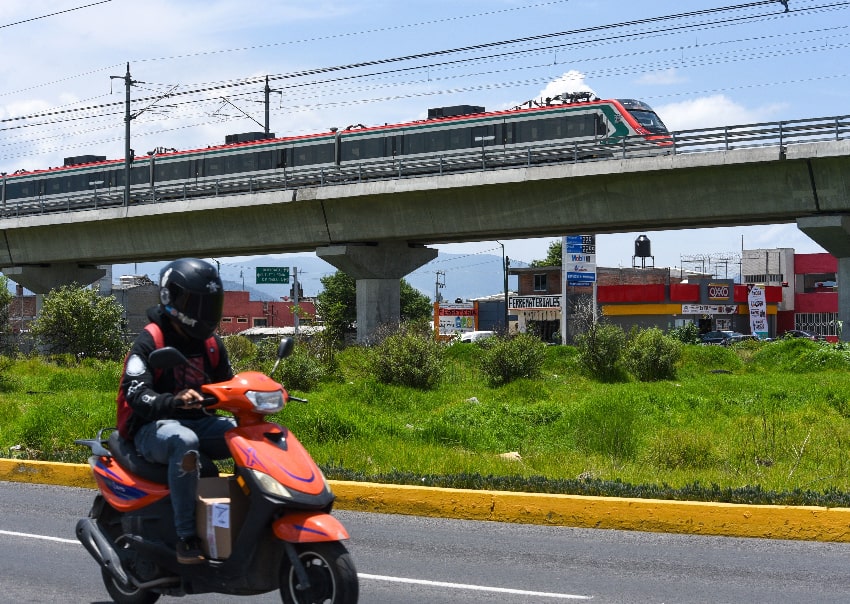
“That’s a hallmark of this government. … There is public investment … in the creation of infrastructure,” López Obrador said, adding that the projects provide a boost to the construction industry and in turn benefit the economy more broadly and create jobs.
“With public investment and foreign investment the economy is growing,” he said.
Before opening the floor to questions, AMLO thanked United States President Joe Biden for deciding “not to implement any measure against Mexico” for the country’s alleged failure to adequately protect the critically endangered vaquita marina porpoise, which is endemic to the upper Gulf of California.
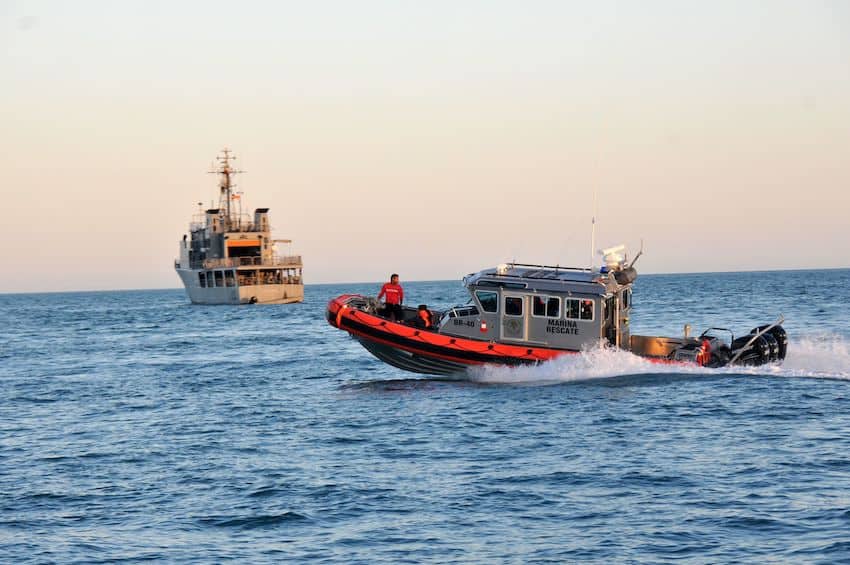
One reporter asked López Obrador about his upcoming trip to Colombia, where he will meet with President Gustavo Petro.
“We’re going to be in Colombia on about the 8th and 9th of September and in Chile on the 10th and 11th,” said López Obrador, who has previously noted that he will visit the latter country to attend events marking the 50th anniversary of the death of former Chilean president Salvador Allende.
“… In the case of Colombia, one of the issues to deal with is cooperation to combat the drug trafficking problem, and also the application of welfare programs because the causes of violence have to be addressed,” he said.
“Human beings aren’t bad by nature. We’re not born bad, it’s [certain] circumstances that lead some people to take the path of anti-social behavior and those circumstances have to be changed. Inequality and poverty have to be combated, work opportunities and fair salaries have to be guaranteed, young people have to be looked after, cultural, moral and spiritual values have to be strengthened. We have to seek to live in a better society, that is essential to combat the scourge of violence,” AMLO said.
Later in his presser, López Obrador made the seemingly preposterous claim that Mexico-based correspondents of foreign newspapers are under the control of businessman Claudio X. González, former foreign affairs minister Jorge Castañeda and journalist Héctor Aguilar Camín.
“They don’t just manipulate here or try to manipulate or seek to manipulate in Mexico. No, they have connections with the … world press, … The Financial Times, The Wall Street Journal, The New York Times. Who runs all that? The same people – Claudio, Castañeda, Aguilar Camín have control of the correspondents of those international newspapers,” he said.
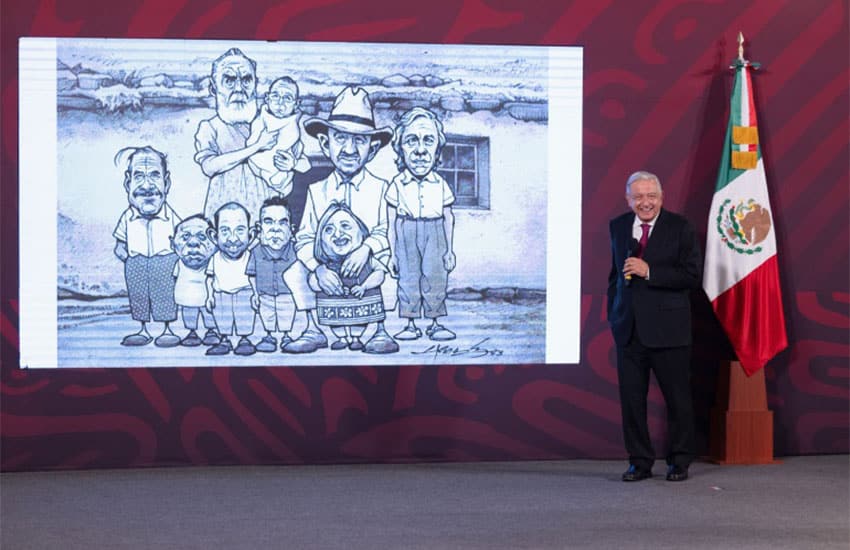
“… On one occasion the editors of The Los Angeles Times started to sense that something strange was happening because their correspondent in Mexico only sent articles against us … but they have other sources and the people in Los Angeles, and here as well, have a different opinion, supporting the transformation,” López Obrador said.
“So, one of those executives decided to come to Mexico and went to the Isthmus of Tehuantepec and carried out a journalistic investigation and interviewed the people and found another reality, which wasn’t what the correspondents – controlled by Claudio and by Castañeda and by Aguilar and by [León] Krauze – described,” he said.
The article the president appeared to be referring to was published last December under the headline “Why is AMLO one of the world’s most popular presidents? We took a road trip through Mexico to find out” and was in fact written by a Mexico-based correspondent for The Los Angeles Times, rather than one of the newspaper’s editors.
Wednesday
AMLO announced early in his press conference that he was launching a new mañanera segment in which he will present the remarks of selected people on issues related to the 2024 elections.
López Obrador said that he “can no longer say much” due to INE’s order to abstain from speaking about electoral issues, and noted that his proposal was to call the new section “No lo digo yo” (It’s Not Me Saying It).
The views of others will be presented “so that the people have information,” he said.
López Obrador inaugurated the new segment with an interview broadcast earlier this week in which former president Vicente Fox made a potentially damaging remark about Senator Xóchitl Gálvez, an aspirant to the Broad Front for Mexico’s candidacy for the 2024 presidential election.
In the video presented by AMLO, Fox said that “lazy people” don’t have a place in government or “the country,” and asserted that citizens should find a job rather than depend on welfare payments.
“As Xóchitl says, get to work cabrones [assholes],” Fox said.
López Obrador called for the remark to be played again, saying that it went to “the heart of the matter.”
“INE, … I have been notified, I’m not going to say [anything],” added the president, who has claimed that Gálvez is opposed to government welfare and social programs.
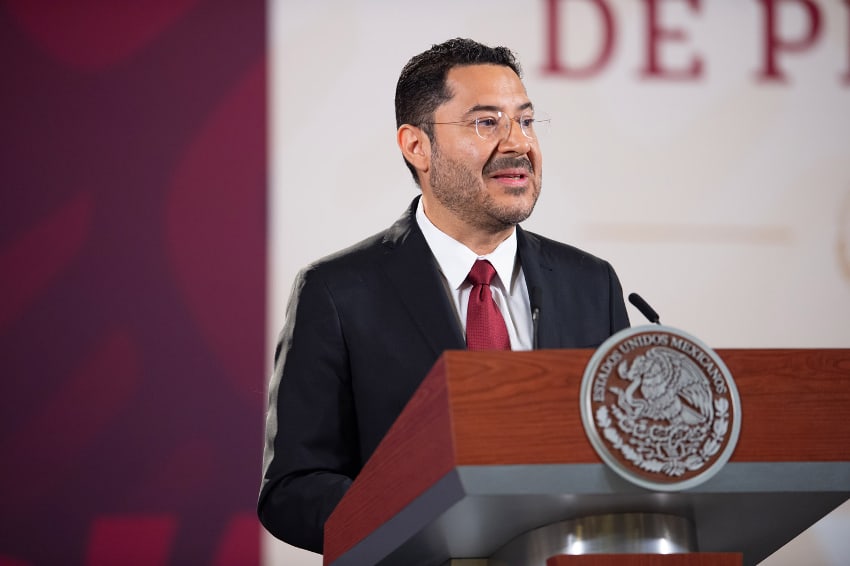
Mexico City Mayor Martí Batres attended AMLO’s presser for a second consecutive day, and noted that an additional five stations along Line 12 of the capital’s metro system – an elevated part of which collapsed in May 2021, killing 26 people – reopened last Saturday.
Fourteen of the 20 stations along Line 12 – the subway system’s newest line – are now open, Batres said, adding that the other six will reopen in December.
“This means that in December of this year all of Line 12, from Mixcaoc to Tláhuac, will be reopened and completely reinforced,” he said.
During his Q and A session with reporters, López Obrador said that the government didn’t intend to once again raise with its United States counterpart the issue of U.S. funding of what he characterizes as political groups opposed to his administration.
“There is proof that an agency of the United States government gives money to this association founded by Claudio X. González and that they use that money to attack the government I represent,” he said, referring to Mexicans Against Corruption and Impunity (MCCI).
The government sent a diplomatic note to the U.S. in 2021, asking it to explain why it has provided funding to MCCI, but “there has been no action on the part of the United States government,” AMLO said.
“We’re going to wait and see. Justice sometimes takes a long time, but it arrives. We’re going to wait,” he said.
Despite that outstanding issue, López Obrador affirmed that Mexico has a very good relationship with its northern neighbor.
“We’re the main trade partner of the United States in the world, foreign investment continues arriving like never before and the economic relationship and the political relationship is very good,” he said.
The president also noted that United States Homeland Security Advisor Elizabeth Sherwood-Randall would return to Mexico next week for meetings with Mexican and Canadian officials.
“The issues [to be discussed are] migration, fentanyl and weapons,” AMLO said before indicating that he was off to eat machaca (dried meat) gifted to him in Sonora as well as “a few coyotas” (empanada-like cookies) for breakfast.
Thursday
At the top of his presser, AMLO asserted that close to 3,000 kilometers of new rail tracks on which passenger trains will run will have been built by the time his term in government ends in late 2024.
The construction of new railroads in Mexico – including the Maya Train railway in the country’s southeast, tracks across the Isthmus of Tehuantepec and the Mexico City-Toluca link – on such a grand scale is “something not seen in decades due to the neoliberal policy that was applied,” López Obrador said.
Manuel Eduardo Gómez Parra, an official with the Ministry of Infrastructure, Communications and Transport, reported that the tracks linking the Lechería station of the Mexico City Suburban Train system to the Felipe Ángeles International Airport are scheduled to be completed next February, with testing to take place between April and June of 2024.
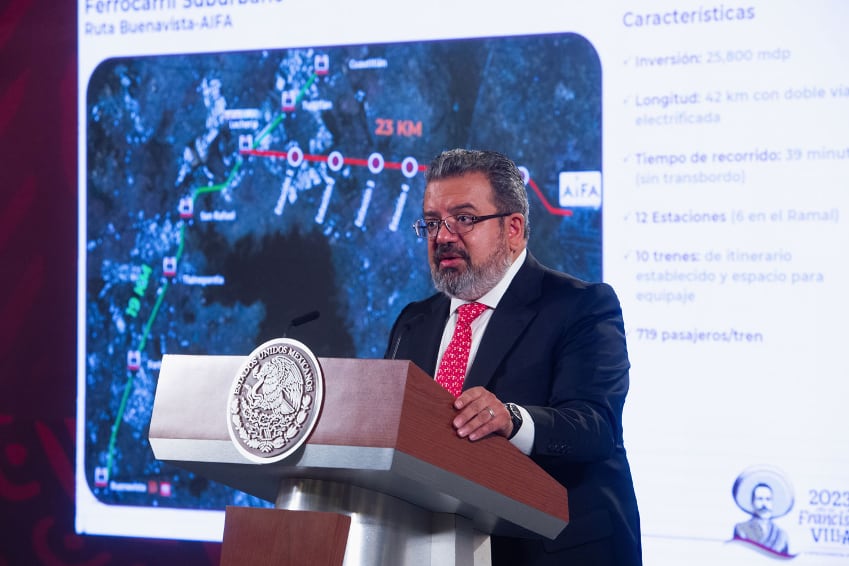
Infrastructure, Communications and Transport Minister Jorge Nuño Lara said that a trip to the airport from the Buenavista station in central Mexico City will take 39 minutes.
“We have 10 passenger trains … with space for luggage. … Each train has the capacity to transport 719 passengers,” he said.
Back at center stage, López Obrador said that the government’s “decentralization plan” – the relocation of federal departments from Mexico City to different parts of the country – was delayed due to the COVID-19 pandemic, but noted that the Ministry of Energy is now based in Villahermosa, Tabasco, and the Ministry of Health has its offices in Acapulco, Guerrero.
“We’ve already started building the customs complex so that the National Customs Agency … [can be based] in Nuevo Laredo, [Tamaulipas],” he said.
“… We’re behind [in the decentralization plan], but we’re going to try to progress as much as we can,” AMLO said, adding that the government has already saved “a lot of money” because it doesn’t have to rent so many buildings in Mexico City and it shut down the offices of international trade and investment agency ProMéxico in cities such as Paris, New York and Tokyo.
Later in his mañanera, López Obrador presented his new “No lo digo yo” (It’s Not Me Saying It) segment for the second time in as many days. On this occasion, he played a video in which Deputy Santiago Creel, an aspirant to the Broad Front for Mexico’s candidacy for the 2024 presidential election, accused the president of “reverse discrimination.”
“In the mañaneras, I’ve been the target of lies and attacks, not only against me but also against my family, the color of my skin, the color of my eyes. It’s reverse discrimination,” said Creel, interior minister in the government led by Vicente Fox.
López Obrador remarked that he wasn’t aware of the concept of reverse discrimination and asserted that he had never attacked Creel’s family or spoken about the color of his skin and eyes.
“It’s a complete lie,” said the president, who last week described the lawmaker as an “aristocrat” and a “fifí”, or posh elite.
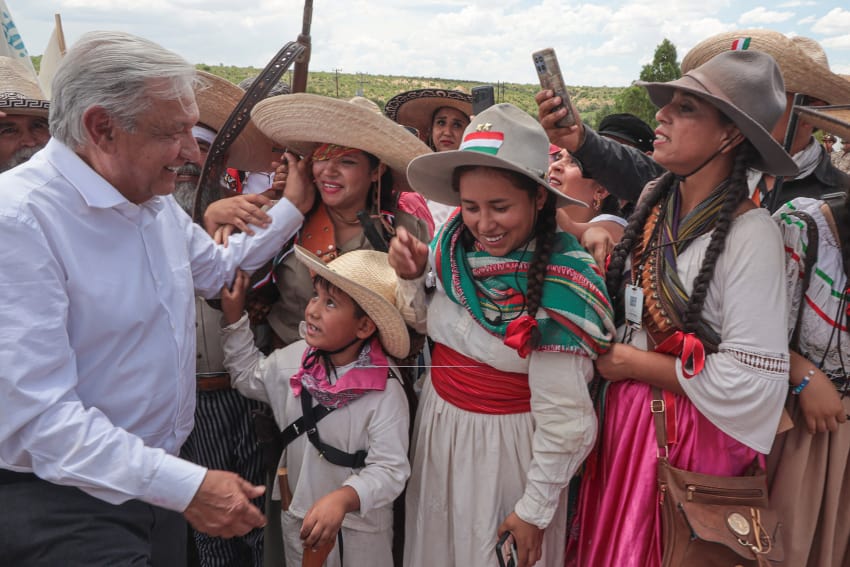
Shortly before concluding his penultimate presser of the week, AMLO noted that he would attend a ceremony in Durango later in the day to mark the 100th anniversary of the death of revolutionary hero Francisco “Pancho” Villa.
He also acknowledged that national statistics agency INEGI was anticipating that final data would show annual economic growth of 4% in June.
“It’s good news, we’re growing,” López Obrador said. “… The economy of our country is growing, which is very important. There is no economic stagnation.”
Friday
After greeting reporters, AMLO acknowledged the presence of Estela de Carlotto, president of the Grandmothers of the Plaza de Mayo, an Argentine human rights organization dedicated to finding children stolen and illegally adopted during the 1976-1983 military dictatorship in the South American country.
“We’re very pleased that you’re here with us. … You are a symbol of resistance, of the defense of human rights and at the same time a defender in Latin America, in the world, of those who suffer due to authoritarianism. May fascism never return to our America,” he said.
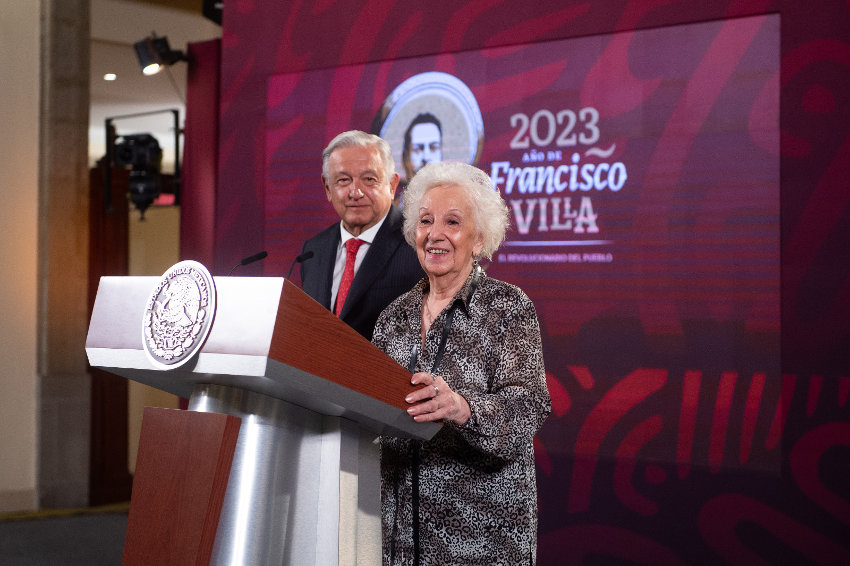
There was an update on another transport project at AMLO’s final press conference of the week, with officials speaking about a new trolleybus line between the municipality of Chalco in México state and the Santa Marta metro station in the Mexico City borough of Iztapalapa.
“This project is a good example of coordinated work between the federal government, the government of México state and the Mexico City government,” said México state Governor Alfredo del Mazo Maza.
The 18.5-kilometer-long line along which “zero emissions” buses will run is expected to be completely finished during the first quarter of next year, del Mazo said.
The governor said later in the presser that 3 million trips are made on a daily basis between Mexico City and neighboring México state, which includes many municipalities within the metropolitan area of the capital.
“It’s estimated there are close to 22 million residents in the metropolitan area … and that’s why building these connectivity projects, these mass transit projects, is important,” he said.
The aim of the new trolleybus line, the Toluca-Mexico City railroad and all other transport projects is to save time and money for passengers, del Mazo added.
During his engagement with reporters, López Obrador said that the amount of US $30 million that the government is seeking from imprisoned former Pemex CEO Emilio Lozoya to compensate for corruption in which he was allegedly involved is “fair.”
“The damage caused to public funds was considerable. Of course, it wasn’t just Mr. Lozoya who was involved … but he himself declared how the relationship with the company Odebrecht was managed,” AMLO said, referring to a Brazilian firm from which the ex-Pemex chief is accused of receiving millions in exchange for awarding it a lucrative contract for work on the the state oil company’s refinery in Tula, Hidalgo.
Later in his presser, the president explained the raison d’être of his new mañanera segment.
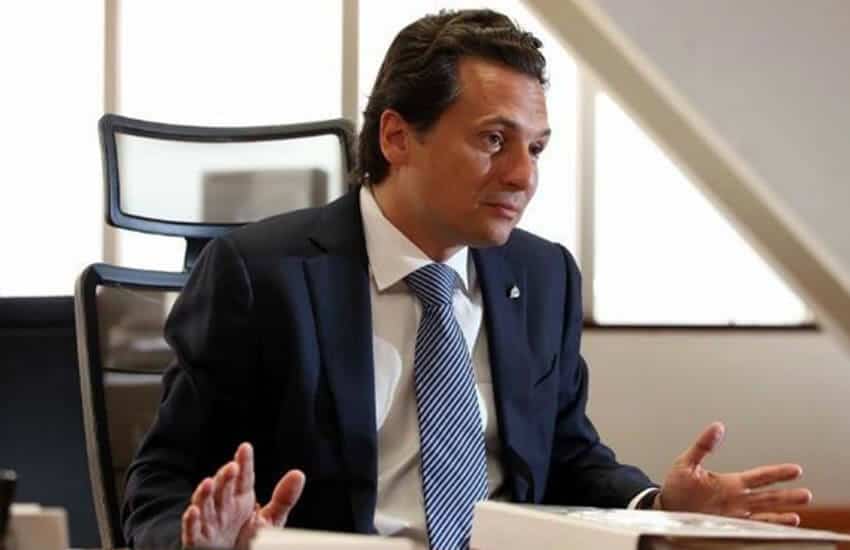
The “purpose” of “No lo digo yo” is to expose what is hidden by the “conventional media,” he said.
“There are a lot of things that radio, television and newspapers don’t disseminate because it doesn’t suit them. … There is a complicit silence in the majority of the media,” AMLO said, asserting that most outlets seek to manipulate rather than inform.
He claimed that the INE is “like the Holy Inquisition” and described the electoral oversight body as an “institute of censorship” given the gag order it imposed on him.
Late in his press conference, the president noted that he would once again travel to Mexico’s southeast over the weekend to inspect progress on the Maya Train railroad.
“In no other place in the world is a public project like the Maya Train being built,” he said.
“In no other place in the world is a 1,555-kilometer railroad being built in 4 1/2 or five years, nor at the cost for which this project is being built. There is no other project in the world that is using such a large workforce,” López Obrador said.
“I have to say this myself – it even seems that I’m bragging a lot … [but] I have to say it because there’s no way the radio and television stations and newspapers are going to say it,” he said shortly before leaving the mañanera stage.
By Mexico News Daily chief staff writer Peter Davies (peter.davies@mexiconewsdaily.com)
